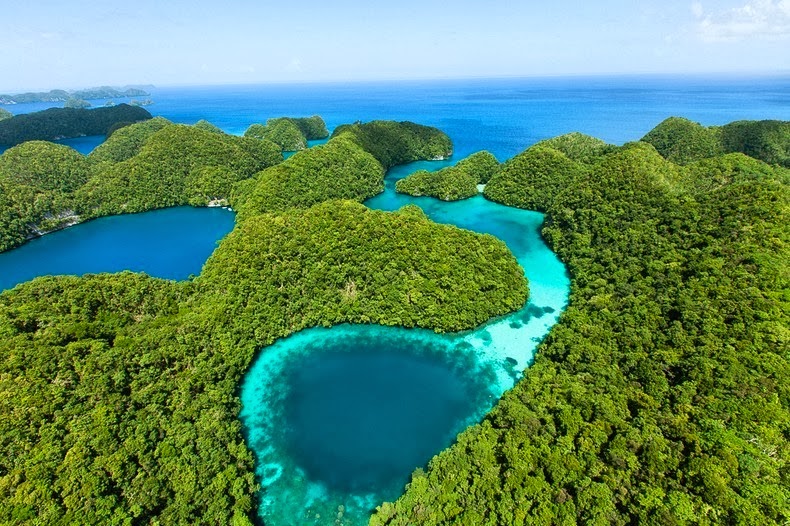The Rock Islands of Palau, also called Chelbacheb, are a small collection of limestone or coral uprises, ancient relics of coral reefs that violently surfaced to form Islands in Palau's Southern Lagoon, between Koror and Peleliu, and are now an incorporated part of Koror State. There are between 250 to 300 islands in the group according to different sources, with an aggregate area of 47 square kilometres (18 sq mi) and a height up to 207 metres (679 ft).

Palau is an archipelago of about 250 islands, located in the western Pacific Ocean. It is its own country – the Republic of Palau, although geographically it is part of the larger island group of Micronesia. For over 30 years it was a part of the United Nations Trust Territory of the Pacific under United States administration. It finally gained its total independence in 1994.

Palau is a beautiful tropical paradise, and one of the true unspoiled destinations on the planet. Most of the 100-plus islands are small low-lying coral islands, ringed by barrier reefs and uninhabited. The country's population of around 21,000 is spread across 250 islands forming the western chain of the Caroline Islands.

Ippei & Janine Naoi
The aesthetic beauty of the site is heightened by a complex reef system featuring over 385 coral species and different types of habitat. They sustain a large diversity of plants, birds and marine life including dugong and at least thirteen shark species. The site harbours the highest concentration of marine lakes anywhere, isolated bodies of seawater separated from the ocean by land barriers. They are among the islands’ distinctive features and sustain high endemism of populations which continue to yield new species discoveries.

Ippei & Janine Naoi
The remains of stonework villages, as well as burial sites and rock art, bear testimony to the organization of small island communities over some three millennia. The abandonment of the villages in the 17th and 18th centuries illustrates the consequences of climate change, population growth and subsistence behaviour on a society living in a marginal marine environment.

What to See

Palau is an archipelago of about 250 islands, located in the western Pacific Ocean. It is its own country – the Republic of Palau, although geographically it is part of the larger island group of Micronesia. For over 30 years it was a part of the United Nations Trust Territory of the Pacific under United States administration. It finally gained its total independence in 1994.

Palau is a beautiful tropical paradise, and one of the true unspoiled destinations on the planet. Most of the 100-plus islands are small low-lying coral islands, ringed by barrier reefs and uninhabited. The country's population of around 21,000 is spread across 250 islands forming the western chain of the Caroline Islands.

Ippei & Janine Naoi
The aesthetic beauty of the site is heightened by a complex reef system featuring over 385 coral species and different types of habitat. They sustain a large diversity of plants, birds and marine life including dugong and at least thirteen shark species. The site harbours the highest concentration of marine lakes anywhere, isolated bodies of seawater separated from the ocean by land barriers. They are among the islands’ distinctive features and sustain high endemism of populations which continue to yield new species discoveries.

Ippei & Janine Naoi
The remains of stonework villages, as well as burial sites and rock art, bear testimony to the organization of small island communities over some three millennia. The abandonment of the villages in the 17th and 18th centuries illustrates the consequences of climate change, population growth and subsistence behaviour on a society living in a marginal marine environment.



0 comments:
Post a Comment